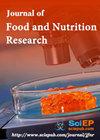Dietary Flavonoids Protect Human Brain Microvascular Endothelial Cell from Oxidative Stress-induced Dysfunction
IF 0.6
4区 农林科学
Q4 FOOD SCIENCE & TECHNOLOGY
引用次数: 0
Abstract
Blood-brain barrier (BBB) is involved in the pathogenesis of many neurological diseases and is particularly susceptible to oxidative stress. Primary human brain microvascular endothelial cell (HBMEC), the major component of BBB, plays a major role in its creation and maintenance. Growing evidence suggests an inverse relationship between dietary flavonoids intake and cardiovascular risk, possibly due to their antioxidative effects. This study systematically investigated the effects of four common and abundant flavonoids in HBMEC under oxidative stress microenvironment. The results showed that H 2 O 2 resulted in a 70% inhibition of capillary network formation, 80% growth reduction, and a 2.5-fold increase in apoptosis. However, the addition of quercetin, apigenin, and genistein mitigated H 2 O 2 -induced dysfunctions in HBMEC by 80% to 95%. In addition, quercetin, apigenin and genistein exhibited a 90% reversal of H 2 O 2 -induced oxidative stress, oxidative lipid and DNA damage. In contrast, myricetin neither reversed H 2 O 2 -induced oxidative stress nor displayed any protective effects in HBMEC. Interestingly, quercetin and apigenin caused a 2-fold increase in NRF2 and NQO1 levels in HBMEC whereas genistein had no impact on their levels. Our research provides pre-clinical evidence indicating that certain flavonoids possess antioxidant properties and alleviate oxidative stress-induced dysfunction in brain endothelium. It highlights the positive impact of flavonoids on the BBB and offers potential therapeutic strategies for treating neurological diseases.膳食黄酮类化合物保护人脑微血管内皮细胞免受氧化应激诱导的功能障碍
血脑屏障(BBB)参与许多神经系统疾病的发病机制,特别容易受到氧化应激的影响。原代人脑微血管内皮细胞(Primary human brain microvascular endothelial cell, HBMEC)是血脑屏障的主要组成部分,在血脑屏障的形成和维持中起着重要作用。越来越多的证据表明,饮食中的类黄酮摄入量与心血管风险呈反比关系,可能是由于它们的抗氧化作用。本研究系统研究了氧化应激微环境下四种常见且丰富的黄酮类化合物对HBMEC的影响。结果表明,h2o2对毛细血管网络形成的抑制作用为70%,对生长的抑制作用为80%,对细胞凋亡的抑制作用为2.5倍。然而,槲皮素、芹菜素和染料木素的加入减轻了h2o2诱导的HBMEC功能障碍的80%至95%。此外,槲皮素、芹菜素和染料木素对h2o2诱导的氧化应激、氧化脂质和DNA损伤有90%的逆转作用。相反,杨梅素既没有逆转h2o2诱导的氧化应激,也没有显示出对HBMEC的保护作用。有趣的是,槲皮素和芹菜素导致HBMEC中NRF2和NQO1水平增加2倍,而染料木素对它们的水平没有影响。我们的研究提供了临床前证据,表明某些类黄酮具有抗氧化特性,并减轻氧化应激诱导的脑内皮功能障碍。它强调了类黄酮对血脑屏障的积极影响,并为治疗神经系统疾病提供了潜在的治疗策略。
本文章由计算机程序翻译,如有差异,请以英文原文为准。
求助全文
约1分钟内获得全文
求助全文
来源期刊

Journal of Food and Nutrition Research
农林科学-食品科技
CiteScore
1.60
自引率
9.10%
发文量
0
审稿时长
1 months
期刊介绍:
Journal of Food and Nutrition Research (JFNR) publishes papers focusing on fundamental and applied research in chemistry, physics, microbiology, nutrition aspects, bioactivity, quality, safety, and technology of foods.
 求助内容:
求助内容: 应助结果提醒方式:
应助结果提醒方式:


